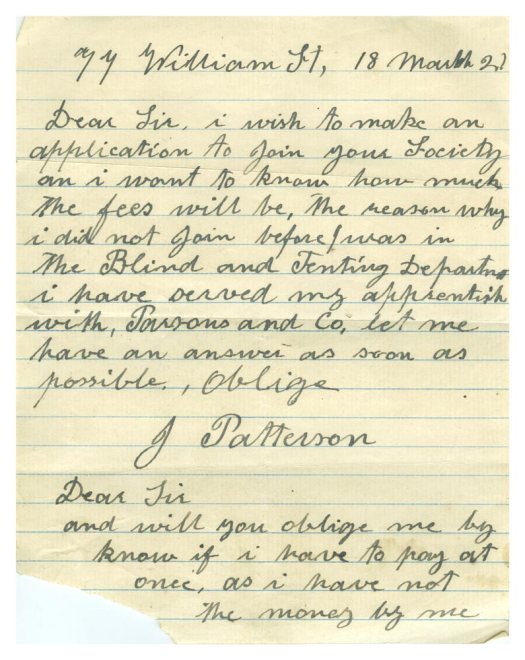The Cardiff Society of Sailmakers was founded in 1855. It survived the shipping industry’s transition from sail to steam, and was finally disbanded in 1938. Records of the Society, covering the period 1893 to its close, are held at Glamorgan Archives (ref.: CL/MS 4.1166).
In the period documented the Society met monthly at the Bute Street Coffee Tavern and, from 1904, at the Adelphi Hotel, also in Bute Street. The collection includes minute books, financial records, contribution books and pre-First World War rule books which list the officers’ duties and salaries, working practices to protect members’ employment, fines for rule breaking and the method of appeal against such fines. Hours of work, meal breaks and rates of pay for day work and overtime are detailed. Members refusing to work on wet sails were to be supported and a separate rule governed conduct at Society meetings, at which members were to stand when addressing the President, and refrain from interrupting speakers. Swearing and insulting language carried the penalty of a sixpenny fine or expulsion from the meeting if the offender persisted.

Bundles of correspondence have also survived relating to negotiations with employers, membership applications and the Federation of Sailmakers of Great Britain and Ireland. The Federation was formed in October 1889, combining existing sailmakers’ friendly societies in various ports. Monthly reports from the Federation’s head office at Hull are included in the Cardiff Society’s archive. These give the state of trade at various British ports with annotations and remarks by the General Secretary on matters of particular significance. The Cardiff Sailmakers broke away from the Federation in 1903, and did not rejoin until 1914. Records of the national Federation from 1889, held at the Modern Records Centre, University of Warwick Library, reflect the concerns of a declining trade, in particular, the introduction of machinery and the employment of untrained workers, including women.
The Cardiff Sailmakers had to deal with the same problems. The first resolution recorded in the minute book on 9 July 1901 is ‘that we finish no work that is commenced by machein while their is men out of work’. In January 1914, before rejoining the Federation, the Society’s negotiators accepted the employers’ terms for wages and hours, on condition that no machines were introduced in any sail loft for one year. The Society’s first act on rejoining the Federation was to forward a resolution to the annual conference opposing the manufacture of canvas articles aboard steamers by officers and seamen, whose legitimate duties were ‘more than sufficient, without undertaking duties pertaining to a separate trade’. It may be significant, in light of its years outside the Federation, that when the Cardiff Society’s rules were revised in 1914 for its readmission, the clause stating that any member working on machine-sewn sail ‘shall be expelled from all benefits of this Society’ was dropped.
The First World War accelerated the pace of change. Untrained labour was introduced in many trades to replace men needed for the armed forces. In sail lofts machines became more widely used and were often operated by women. The minutes of the 1920s record complaints against employers for not keeping to agreements about female labour, and an undated letter to J. S. Frazer of Frazer & Co., with whom the Society was normally on cordial terms, sets out the sailmakers’ opposition to the ‘unnecessary number of young girls and women’ employed in Cardiff and Newport lofts.
Athough the great days of the Sailmakers Society were over before the surviving records begin, up to the 1920s the minutes and accounts record lively debates and social events, an annual dinner, a smoking concert, and, in July 1904, a picnic. Agreements with employers were negotiated, conferences attended and contributions made to the strike funds of other branches, the Life Boat Donation Fund and the Labour Party Committee; J. R. MacDonald was sent 2s. 6d. in 1904, although the minutes note that the proposed 5s. contribution in 1908 was not sent. No explanation is given. When the Society joined the Federation in 1914 its membership stood at 19 (the Grimsby branch had 30 members at that date). During the period documented the highest membership was 27 in 1921 and 1922. Thereafter the records show a steady decline. The minutes of the meetings became briefer until they record merely that the meeting opened at 7pm and closed at 9pm. The Society survived the Federation which disbanded in about 1927, but by the 1930s the membership was hardly sufficient to provide the necessary officers, and in November 1938 the Cardiff Sailmakers Club was closed ‘owing to lack of members’. Its remaining funds of £2 1s. 1d. were divided between the five final members.
